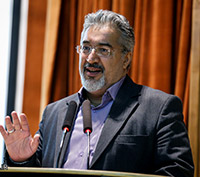Oral history of executive agencies has a national budget
Maryam Asadi Jafari
Translated by Fazel Shirzad
2017-11-21
Note: Emphasizing on the comprehensive support of Institute of Documentation of National Library and Archives of Iran's Islamic Republic, The organizer of the Oral History Development Program of the country's executive agencies, said: "We will continue to support and protect this program. Some of the current organizations in the oral history workshops have already an oral history unit, but nevertheless, it is also important to assimilate activities for such organizations."
In an interview with Iranian oral history website, Gholamreza Azizi referred to Cabinet's resolution of last year of Iran's Islamic Republic based on oral history development of executive agencies according to principles of National Library and Archives, and added:" Dr. Salehi Amiri have proposed initial idea and suggestion at the Cabinet's meeting; fortunately, it was adopted. To do this, we considered two methods: First, let's give our standards to executive agencies to start their work. But, in accord with oral history group of Institute of Documentation and the Research Council of National Library and Archives, we decided not to be limited in announcing instructions. For this reason, we corresponded with the executive agencies and established a virtual and direct workshop for training oral history."

He added: "In this regard, seven workshops were held from Aban 1395(November 1395) to Mehr (October) of this year. Each workshop was for four sessions in four hours that lasted for a month. Among them, six workshops were held in Tehran and one workshop was held in Isfahan. Various executive agencies attended at these workshops such as Presidential Institution, Ministry of Foreign Affairs, Ministry of Oil, Ministry of the Interior, Ministry of Education, Ministry of Defense, Ministry of Energy and organizations such as the Plan and Budget, Atomic Energy, Cultural Heritage, Foundation for the Protection and Publication of Holy Defense Values, army, and foundation of martyrs and Ports and Maritime Organization."
The head of Institute of Documentation of National Library and Archives of Iran's Islamic republic mentioned the history of some organizations in the field of oral history and said:" Some of present organizations in oral history workshops have already an oral history unit and have a history about two decades in this field, but it was also important to assimilate activities for such organizations."
Gholamreza Azizi stated about virtual workshop of oral history: "It is possible for trainees to use these workshops at work or at home. This course was 34 hours and was more advanced, and users were allowed to attend virtual classes by their username in Institute of Documentation website."
Organizer of Oral History Development Program of the country's executive agencies referred the interaction and exchange of individual experiences as one of the most prominent strengths of oral history workshops, and declared:" "It is true that we must step forward on the basis of the methods of Documentation institute according to directive, but we also received some ideas from audience at the meetings. Also, these workshops caused us to give our methods to representatives of institutions to complete their works if they have shortcomings."
To reply a question about the duties of Iran's Institute of Documentation of National Library and Achieves in order to follow the correct process of oral history interviews in executive agencies, Azizi said: "The first oral history conference of executive agencies, which was held on 24th Mehr(October 14) in this year(2017), was about such issues. We invited participants in the last seven workshops to conference and in fact the conference was held to continue the workshops, and some issues was discussed and replied such as oral history problems and challenges in executive agencies and its solutions and skills of interview were discussed. Individuals also stated their objective and practical problems and got response. Therefore, the organization will continue to support and protect this program. We even announced that we could watch their interviews, and determine weaknesses and strengths to take the right direction."
Referring to the provincial oral history workshop in Isfahan, he emphasized:" At the same time as Tehran's workshops, we asked officials of provinces to correspond with provincial departments and offices and invite them to provincial workshops. Fortunately, a workshop was held in Isfahan and the Qazvin province, as the second province, completed the final work to hold workshop next month. This movement is going on and won't end soon."
At the end, the head of Institute of Documentation of National Library and Archives pointed out the obstacles and limitations in this direction:" On the other hand, cultural budgets are one of the first cost-cutting options in times of deficit. On the other hand, oral history projects sometimes impose high costs on organizations, but the responsibility to record oral history for all organizations imposed a necessary budget on the national budget to implement oral history; this problem was resolved. We also informed organizations that the results of oral history interviews are not just about answering historical questions, but the result of interview with employees is a raw material to develop knowledge management particularly implicit and hidden knowledge of employees. In addition to register the organization's history, problems and especially crises and the ways of solution are identified. So the experiences and ideas of staffs and managers will be shared with future managers."
Number of Visits: 5378
http://oral-history.ir/?page=post&id=7476
